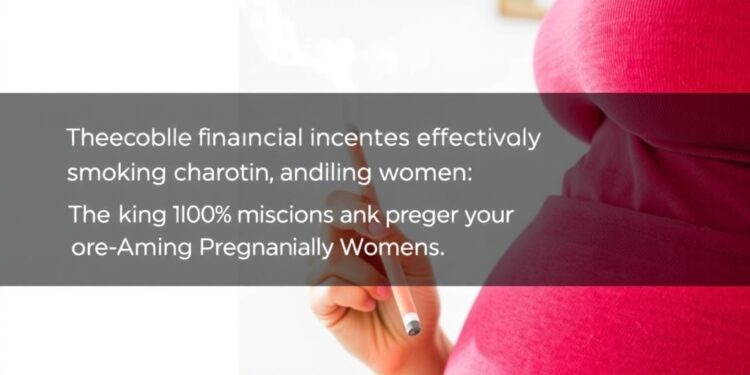Recent findings from a comprehensive review published in the Cochrane Database of Systematic Reviews underscore the effectiveness of financial incentives in aiding smoking cessation, particularly among pregnant individuals. This research, co-led by a public health expert from the University of Massachusetts Amherst, provides unprecedented high-certainty evidence that these incentives can significantly aid in quitting smoking, an important public health concern due to the adverse effects of smoking during pregnancy.
The study not only reinforces existing conclusions from prior literature indicating moderate confidence in the success of financial rewards for smoking cessation, but it also highlights an increased understanding achieved through the inclusion of more recent studies. These new findings provide robust evidence that financial incentives help pregnant individuals not only to quit smoking but also to maintain their cessation over time. The authors of the review note that this could have impactful implications for health policies and smoking cessation programs aimed specifically at expectant mothers.
Smoking during pregnancy poses significant risks to both the parent and the developing fetus. This study is crucial because it addresses the limitations of conventional pharmacological interventions commonly used for smoking cessation, which many pregnant individuals are reluctant to utilize due to health concerns. This underscores the urgent need for alternative, non-pharmacological approaches to smoking cessation that can effectively support pregnant populations in their efforts to quit.
The systematic review examined 47 mixed-population studies from diverse regions including the United States, Europe, Southeast Asia, Hong Kong, and South Africa, encompassing nearly 22,000 participants, with more than 14 studies being added to the update. The results revealed that financial incentives not only increased short-term smoking cessation rates but also demonstrated efficacy in long-term follow-ups, even after the cessation of incentives. This fact is vital as it suggests sustainable behavioral changes resulting from these interventions.
Particularly for pregnant populations, the review discovered that for every 100 individuals receiving financial incentives to quit smoking, approximately 13 achieved successful cessation for six months or longer. In contrast, only six out of 100 participants who did not receive such incentives managed to quit. The stark contrast in success rates highlights the critical role that financial rewards can play in smoking cessation efforts among pregnant women.
The financial incentives varied in amount across the studies reviewed—from as low as self-deposits returned upon cessation to substantial rewards ranging from $45 to $1,185. Interestingly, the analysis concluded that the specific value of the incentives did not necessarily correlate with the quit rates. This suggests that the mere presence of financial rewards may be sufficient to stimulate cessation efforts rather than the magnitude of the financial incentive offered.
The breadth of the study’s geographical scope helps to support the generalizability of these findings across different cultures and healthcare systems, indicating that financial incentives are a viable tactic that can be adapted to various settings concerning smoking cessation. Lead author Caitlin Notley, an addiction sciences professor at the University of East Anglia, emphasized the global significance of these results, noting that smoking remains a leading preventable cause of illness and death worldwide.
Hartmann-Boyce, a senior author of the study, highlighted the common misconceptions surrounding the use of financial incentives in addiction recovery. Many people view monetary rewards for quitting as ethically questionable or potentially manipulative. However, she argues that those who are addicted to nicotine represent a population often desperate for support. By framing financial incentives as tools that can effectively address psychological aspects of addiction, the research advocates for a more compassionate understanding of those struggling with smoking dependencies.
In recent trends, California took a pioneering step by implementing a financial incentives program through Medicaid aimed at reducing stimulant use disorder. This program laid foundational groundwork for extending similar approaches to smoking cessation. Given California’s positive federal approval for this initiative, other states have begun to follow suit, underscoring a growing recognition of the importance of such strategies in behavioral health interventions.
Furthermore, the integration of contingency management—the structured provision of rewards to reinforce positive behaviors—is seen as a gold standard approach for treating various addictions. The implications of such research findings could prompt a reevaluation of smoking cessation funding and resource allocation strategies, ultimately fostering collaborative efforts to ensure better health outcomes for vulnerable populations, especially during pregnancy.
In sum, the advancement of understanding related to financial incentives and smoking cessation offers a promising narrative for public health advocates. It reinforces the belief that effective interventions capable of helping individuals transition away from nicotine addiction can and should be prioritized, especially in populations where traditional methods may not suffice. As more evidence emerges, it is critical for health policymakers to consider the incorporation of financial incentives in comprehensive tobacco control strategies to maximize public health benefit.
The convergence of behavioral science, public health policy, and financial strategy presents an intriguing avenue for advancing smoking cessation. This research sheds light on how such approaches may not only be beneficial but essential for creating supportive environments that facilitate lasting behavior changes. As we continue to learn more, the objective remains clear: to reduce smoking prevalence and ultimately improve health outcomes for future generations.
Subject of Research: People
Article Title: Incentives for Smoking Cessation
News Publication Date: 13-Jan-2025
Web References: Cochrane Library
References: None available
Image Credits: None available
Keywords: Smoking cessation; financial incentives; public health; pregnancy; behavioral intervention; addiction recovery; nicotine dependence; health policy; Cochrane review; contingency management.




